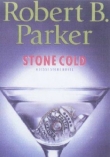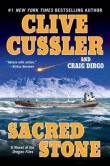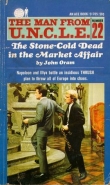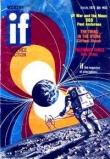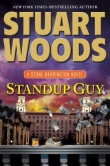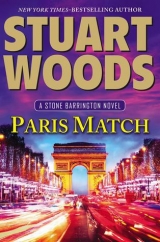
Текст книги "Paris Match"
Автор книги: Stuart Woods
Жанр:
Политические детективы
сообщить о нарушении
Текущая страница: 2 (всего у книги 15 страниц)
4
They were halfway through their first course, a slab of fresh foie gras, when Mirabelle Chance finally took her seat. The gentlemen all rose to receive her, and Marcel introduced her to those at the table she had not yet met.
“I do beg your pardon,” she said, with the slightest French accent layered over upper-class British English. “There was a line in the loo.”
“There always is,” Viv said, and everybody laughed.
“Now, Mr. Barrington,” Mirabelle said, “since I know your name, it is time for me to learn who you are, where you come from, and everything else about you of any possible interest.”
Stone laughed. “Well, I am an attorney,” he said. “I come from New York, and everything else about me you will have to root out, one piece of information at a time.”
“Then I must work for my supper?”
“Only as hard as you wish to,” Stone replied, “but before you start, I think I’m entitled to an exchange of information.”
“All right,” she said. “I am a Parisienne from my birth, though, having a British mother and an indifferent French father, I went to school and university in England, then I at first modeled, and now I design dresses, including the one I am wearing.”
Stone looked her up and down. “You are very good at what you do,” he said.
“Now, my turn to dig,” she said. “Where were you schooled?”
“Within a few blocks of my home in Greenwich Village, at P.S. Six, at New York University, then at their law school.”
“No further graduate work?”
“Yes, I got my Ph.D. as a patrolman and detective with the New York Police Department. I attended for fourteen years, but the degree is purely honorary.” He nodded toward Dino. “That gentleman over there, whose name you will remember is Dino, was my partner as a detective, and he now rules the NYPD as police commissioner. His wife, Vivian, or Viv, as we call her, was a decorated detective before she retired to enter the private sector.”
“My goodness, so many policemen. I feel quite at home, because my father, Michel Chance, is the prefect of police and the Cabinet, the most important of several prefects and roughly analogous to the position of Commissioner Bacchetti.”
Marcel spoke up. “May I say I feel extremely safe at this table?”
“And well you should,” Mirabelle said.
“And how did you avoid becoming a police officer?” Stone asked.
“That was left to my brother, who has risen through the ranks to the position of commandant, and is in charge of investigations in Paris.”
“Until Dino’s recent promotion,” Stone said, “he held that position in New York—chief of detectives.”
“Well,” Mirabelle said, “now we have everyone’s credentials.”
“Not quite,” Stone said. “Which university did you attend in Britain?”
“Cambridge,” she replied, forking a considerable chunk of foie gras between her lush lips.
“I congratulate you,” Stone said.
“Thank you, but your congratulations are late, since I earned my degree some fifteen years ago.”
“My apologies for my tardiness. For whom do you design dresses?”
“I am strictly couture,” she said. “I make dresses for clients, I do not manufacture them for the masses, or even for the elite classes.”
“If you were a Frenchwoman, Stone,” Marcel said, “you would know all this. Mirabelle is quite famous in her world.”
“I never doubted it,” Stone said. “Mirabelle, perhaps you could tell me why there are two men in black suits across the room there”—he nodded—“staring at you.”
“My father and my brother feel that, since I am of their family, I require police protection at all . . . well, at nearly all times.”
“I’m glad there are exceptions,” Stone said.
“And perhaps you could tell me, Stone, why the man and woman in gray over there”—she nodded—“are staring at you?”
“They are employed to see that I may do business in Paris without coming to harm.”
“Since you are dealing with Marcel, I assume this is l’Arrington business of which you speak?”
“It is.”
“Stone,” said Marcel, “is the originator of the Arrington brand, having opened the first one in Bel-Air, Los Angeles. He also sits on the board.”
“Along with Marcel,” Stone pointed out.
“Well,” said Mirabelle, “if I should ever need a place to sleep, I shall know whom to call.”
“I am at your beck and call,” Stone said, handing her a card, “and I hope I may be of service soon.”
Mirabelle tucked the card into her bosom. “We shall see,” she said.
–
TWO HOURS LATER, sated and suffering from jet lag, Stone and his party went downstairs to his waiting Mercedes van. It wasn’t there.
Stone was about to call Rick LaRose when his cell phone vibrated. He glanced at the calling number. “Yes, Rick?”
“Your van has become unavailable,” Rick said. “Get everybody back inside and wait for my call.”
Stone herded his group back inside. “Rick LaRose’s orders,” he said.
“Oh,” Mirabelle said, “there is my car outside now.” She said good night to all, went outside and departed.
A moment later, a long black car appeared outside, and Rick LaRose got out and came inside. “We have another car for you,” he said.
They trooped outside and got into the car. As they drove away Stone asked, “Whose car is this?”
“The ambassador’s,” Rick replied.
“And what happened to the van?”
“Don’t ask.”
5
Stone was awakened by the room service waiter early the next morning. For a moment he forgot he had left the order on the doorknob.
He let the man in, then got back into bed while the waiter set a tray on his lap, along with a copy of the International New York Times and one of Paris Match. Stone tried that, but his French wasn’t good enough to read it, so he reverted to the Times. He switched on the TV and found CNN.
His phone rang. “Yes?”
“It’s Rick.”
“Good morning, Rick.”
“Do you have the TV on?”
“Yes, on CNN.”
“Turn it to the local news, channel two.”
Stone switched and found a Frenchwoman gazing into the camera, producing a torrent of her language. “Okay, got it. What am I watching?”
“Just hang on for a minute.”
“Have you planted something on TV, Rick?”
“No, but I got a tip to watch this.”
The woman’s image disappeared, replaced by that of a burning vehicle.
“What’s this, a bomb in Paris?”
“No, that’s your van,” Rick said.
Stone looked more closely, but it was hard to tell. “And why is it on fire?”
“Someone is sending either you or me a message.”
“If the message is for me, what is it?”
“If it’s for you, I think it means, ‘Pay attention this time.’”
“To what?”
“To the people who tried to kill you when you were last in Paris.”
“The Russians?”
“Looks that way.”
“Let’s assume for a moment that the message is for you, instead of me. What is the message?”
“‘Stop trying to protect Stone Barrington.’”
“What happened to the driver?”
“He was standing, leaning on the van, having a cigarette—he’s not allowed to smoke in the van—and someone laid a cosh upside his head.”
“Is he all right?”
“He’s in our little clinic at the embassy, and he has a very bad headache, but the doc says he’ll be okay.”
“So, how are you going to react to this message?”
“By replacing the van. We have more than one. A black one will be there at noon to pick you up for your lunch date with Marcel duBois.”
“How did you know I was having lunch with duBois?”
“I’m in the CIA, remember?”
“Oh, yeah, I forgot: you know everything.”
“Near enough to everything—enough to put two men in the van this time: one to protect you and the other to protect him.”
“Well, I hope your plan works. From what I just saw on TV, I don’t think the air-conditioning could keep up.”
“It’ll be okay this time, I promise. You know, this incident is probably going to help us more than it’ll hurt.”
“How will it do that?”
“By telling Lance that our little operation here is a good idea. Lance likes learning that he was right.”
“Who doesn’t?”
“You’re going to be getting another call this morning.”
“From whom?”
“Mirabelle Chance.”
“The last woman I met in Paris was one of yours. Is Mirabelle one of yours, too?”
“I’m working on that. In fact, you could be a great help to me.”
“You want me to recruit her for you? I wouldn’t know how to begin.”
“She clearly likes you. We know that from her behavior at the dinner last night.”
“I hope you’re right. I certainly like her.”
“She may raise the subject with you. I, and particularly Lance, would be grateful if you could help her move in our direction.”
“What do you want from her?”
“Anything we can get. She’s very well connected in Paris, beginning with her father and brother, and continuing down her client list, which is heavy with the wives and mistresses of government officials.”
“Okay, Rick, if she asks me if she should become a resource for the Agency, I’ll say, sure, why not?”
“Come on, Stone, you can do better than that.”
“I can’t promise that I will.”
“I’ll rely on your good sense. Gotta run. The van will be there at noon.” He hung up.
Stone stared at the breakfast in his lap, congealing before his eyes. Eggs Benedict did not benefit from getting cold. The phone rang. “Hello?”
“Good morning, Mr. Barrington,” Mirabelle said.
“Good morning, Mademoiselle Chance,” he said.
“Are you free for breakfast?”
“I am, if we can do it here.”
“At l’Arrington?”
“In the penthouse suite.”
“I’ll be there in half an hour. Au revoir.” She hung up.
Stone called down to room service to collect the tray and to double the order, then he got out of bed and into a shower and a shave.
6
Stone’s doorbell rang, and he opened it to find standing there Mirabelle Chance, dressed to the gills. Cheeks were kissed.
“Do you always dress so beautifully for breakfast?” he asked, admitting her to the suite.
“Of course,” she replied. “I am my own best advertising. Do you like it?”
“You make that dress look gorgeous,” he said.
“I’m not sure that I understand your language well enough to know if that is a criticism of the dress.”
“Not at all,” Stone replied. “The dress would make any other woman look beautiful.”
“Again, I’m not sure . . .”
“I compliment the beauty of both you and the dress,” he said. “Without reservation.”
She blinked, then smiled. “Have you coffee?” she asked.
The doorbell rang. “I do now.” He admitted the waiter, who set up the table on Stone’s terrace. Shortly, they were seated, and Mirabelle had her coffee.
“Beautiful view, isn’t it?” Stone said.
“That is the Luxembourg Palace,” she said, pointing, “and surrounding it are the Luxembourg Gardens. And they are both very beautiful. How well do you know Paris?”
“Not as well as I expect to in a couple of weeks. What I need is a personal guide.”
She leaned forward on her elbows. “Is that all you require?”
“The river of my needs is broad and deep,” he said.
“So, then, it takes more than one woman to meet them?”
“Not necessarily. It just takes more than a personal guide.”
“A multitasker, then?”
“If you want to be technical.”
“Do you?”
“I would prefer not.” The waiter, who had been rearranging the silverware, brought two plates of eggs Benedict from the hotbox below, set them in place, and whisked away the covers.
“Bon appétit,” he said, then vanished.
“Now we are alone,” she said.
“No, we have eggs Benedict.”
“Ah, yes.” She dug in. “Tell me,” she said after a moment’s chewing, “what is your connection to the CIA?”
“I am a consultant to the Agency,” Stone said.
“What does that mean?”
“It means that sometimes they ask for my advice, and I give it. At other times they don’t, and I don’t.”
“Are you paid for this advice?”
“Only on a piecework basis.”
“How much per piece?”
“I bill them by the hour. I am an attorney, after all, and that is our wont.”
“You won’t what?”
“It means our usual practice or desire.”
“You bill the CIA for your desires?”
“No, I bill them for their desires. What is your connection to French intelligence?”
“None,” she said. “They have so many—anagrams?”
“Acronyms.”
“Ah, yes, acronyms. French intelligence has too many, and I would never know with whom I was dealing. I have been asked, sort of, to become associated with American intelligence.”
“In what capacity?”
“As a conveyor of gossip, apparently.”
“I suppose you would hear quite a lot of that from your clients.”
“Constantly, but rarely anything that would amuse the CIA.”
“You never know what might entertain them,” Stone said. “Did you accept their offer?”
“Not yet. What is your advice?”
“Would it amuse you to associate yourself with them?”
“Possibly.”
“Then accept, but negotiate the terms.”
“How do you mean?”
“You are a businesswoman: whatever they offer you, demand more.”
“Will I get it?”
“You will get some of it, that’s what a negotiation is about: you rarely get everything you want.”
“I nearly always get everything I want,” she said emphatically.
“I’m not surprised. Perhaps I should hope that you don’t want me.”
“If I should want you, then God help you.”
“In that circumstance I would prefer to handle the transaction myself.”
She laughed.
“That’s the first time this morning you’ve laughed.”
“I don’t laugh, unless I am really amused.”
“Then I will take your laugh as a compliment—assuming that you are laughing with me, rather than at me.”
“An interesting distinction,” she said. “When I was at school in England I learned, with some difficulty, when Englishmen were being funny. I have had much less experience with Americans.”
“Anything I can do to help,” Stone said.
“Was that an offer of or a request for sex?”
“Not necessarily.”
“You see! I think maybe that was meant to be funny, but I’m not sure. What does ‘not necessarily’ mean?”
“Not in every instance. It’s best to go back a couple of sentences to my offer of help.”
“What sort of help?”
“Almost anything you need.”
“Almost?”
“It’s best to reserve a little wiggle room.”
“Wiggle? Is that like wriggle?”
“The same, only more colloquial.”
She laughed again. “You are fun to talk with.”
“I’m so glad, I would not like to bore you.”
“I will let you know when you are boring me.” She looked at her wristwatch.
“Ah, already,” Stone said.
“No, no, I just have an appointment in twenty minutes, and there is the rush-hour traffic.”
“Then you had better finish your eggs.”
She pushed back from the table. “No, only half my eggs are on my diet. I must continue to be able to wear my own designs.”
“Would you like to have dinner this evening?”
“Just the two of us?”
“I prefer conducting business during the daylight hours, reserving the evening for more intimate occasions.”
“When and where?”
“Eight o’clock? At your favorite restaurant.”
“Eight is good. I don’t have a favorite, there are too many in Paris.”
“Your favorite today.”
“All right. Do you know Brasserie Lipp? In Saint-Germain-des-Prés?”
“I do.”
“Eight o’clock then.”
They rose, bussed, and she departed.
Stone sat down and finished his eggs.
7
The new black Mercedes supervan was indeed waiting for him in l’Arrington’s courtyard at the appointed hour, and it got through the midday Paris traffic with few delays. Stone noted the second man up front, and he could see the short barrel of an automatic weapon protruding from the man’s cradled arms. He found that reassuring but unsatisfying, since it apparently indicated that Rick believed any opposition would be similarly armed. If bullets started flying, he would prefer single squirts to spraying, even if the vehicle was armored.
The van was stopped at an archway for a security check, then allowed to drive into a courtyard, much like that at l’Arrington, but smaller. There were three large trees in pots arrayed against the walls, and next to each stood a man in black body armor, booted and helmeted, with an automatic weapon slung from a shoulder. The concrete tree pots would provide cover, he assumed.
Inside the front door of the office building of, perhaps, fifteen floors, he was stopped at a desk and required to place his right thumb on a sensor while gazing into a lens with his right eye. The equipment indicated its assent by displaying two photographs of him on a screen: one taken the year before and one taken just now. “Good morning, Mr. Barrington,” a female voice said from the speaker. “M’sieur duBois is expecting you. Please take the elevator at your left to the top floor.”
“Thank you,” Stone replied to the mass of electronic equipment. Stone knew the building housed Marcel’s business operations and that he lived on the top two floors. As the car rose a piece of music, a particular favorite of his, began to play: the Dave McKenna Quartet with Zoot Sims, playing “Limehouse Blues.” The car reached the top floor before McKenna’s piano solo was over, but as he stepped off the elevator, the music continued from unseen speakers. By the time Zoot began his soprano saxophone solo, he was seated in a comfortable chair, a perfect Bloody Mary in his hand, being told by a minion that M’sieur duBois would be with him shortly. He sat back and luxuriated in the wonder of Zoot Sims. Superb. The vodka didn’t hurt, either.
Marcel tapped him on a knee as “Limehouse Blues” died. “Bonjour, Stone. Do not rise.”
The Frenchman sat down beside him. Their view through a floor-to-ceiling glass wall was of treetops and a view across the city.
“Good morning, Marcel,” Stone finally managed. “I am very impressed by the new wrinkles in your security system. I assume the police-like costumes and weapons of the men downstairs were chosen for a reason?”
“Ah, yes. After our difficulties of last year, your good friend Michael Freeman suggested that the presence of security be overt, rather than the subtlety of men dressed in blue suits with bulges under their arms.”
“An economical and, no doubt, effective change. What about my thumbprint, my cornea, and my taste in music? Where did they come from?”
“The prints were unobtrusively harvested from your person last year,” Marcel replied. “And the music was read from the albums stored on the iPhone in your pocket. Imelda—the name given to her voice—deduced which was the most-played track among them and played it for you. I rather liked it. Are the artists popular in the States?”
“The artists, unfortunately, are all dead, as are most of my favorites—Count Basie, Artie Shaw, Erroll Garner, Duke Ellington, Ella Fitzgerald, et alia. Fortunately, their work survived them.”
“Ah, yes, the same with me. Did you and Mirabelle enjoy your breakfast together?”
“Once again, Marcel, you are well ahead of me. Yes, we did.”
“And have you been enjoying your Blaise?”
“I drive it to my house in Connecticut on a road ideal for it. I think it goes too fast for the police to see.”
“Ah, good.”
“I have also enjoyed the performance of Frederick Flicker, and he and I have come to a more permanent arrangement. I’m grateful for your realization that I needed him.”
“Every gentleman of any substance needs a gentleman’s gentleman to take care of him. I have so much substance myself that I need three, in shifts.”
“I can manage very nicely with the one,” Stone said.
There was the tinkle of silverware from behind them. “And now, shall we have some lunch?” Marcel asked.
They rose and went to the table that had been set for them. Instead of courses, a small smorgasbord was wheeled out on a cart, and they chose what they liked from a dozen dishes.
“So much food,” Stone said. “I hope what we don’t eat will not go to waste.”
“Don’t worry, the kitchen staff are anxiously awaiting the return of the cart. By the end of their lunch hour, it will be empty.”
Champagne was poured for them. Marcel raised his glass. “A Krug ’55,” he said. “I hope you enjoy it.”
Stone enjoyed it.
–
WHEN THE TABLE had been cleared they returned to their seats before the huge window.
“Now,” Marcel said, “I must tell you that I have had an offer for my stock in the Arrington Group.”
“Is it from a Russian source?”
“It is from a corporation, benignly named. No name was attached to it.”
“Then I think we will have to assume that the source is Russian, and that the name is Yevgeny Majorov.”
“It was a more reasonable offer than I would have thought that gentleman would come up with, but I have the same suspicions as you. Should I explore it further?”
“Marcel, should you ever wish to dispose of your Arrington stock, I or my other investors will buy it from you for a better price than the Russians would give you.”
“Oh, no, Stone, I don’t want out,” Marcel said. “I just wondered if we should toy with them a bit.”
“Marcel, these ‘gentlemen’ would regard anything beyond a simple no as an encouragement, and they would become even more of a nuisance than they already are. My advice would be to have your secretary, on your behalf, write a short, blunt refusal to the corporation. Don’t even sign it yourself.”
“All right, I’ll do that.”
“It has been my experience in dealing with criminal elements who seek to disguise themselves in legitimacy, that if you give them so much as a bite, they will want the steak, and the bone, too, on unacceptable terms. They have already accompanied your offer with a violent attack: the CIA van that I and my party rode in to your dinner last night was destroyed while we dined. This is what they like to think of as the carrot and the stick.”
“And how will you answer the loss of the van?”
“The CIA will answer, since the van was theirs, and I expect they will do so emphatically.”
“Will that not escalate the matter?”
“I think the Agency will do it in such a way as to discourage escalation.”
“Do you know how they will do it?”
“No, and I don’t want to know.”
The two men changed the subject and discussed the opening of l’Arrington in detail.
“I’m very impressed with my suite and with what I can see of the lobby and the exterior.”
“By our opening next week, all will be perfection,” Marcel said. “I assure this by throwing the first party in the hotel for the staff and the construction crews. They will bring their wives and girlfriends to dine and drink, and for their party, they will see that everything is perfect. Our party will be a couple of nights later.”
Stone rose to return to his van. “Anything I can do at the hotel?”
“You might send a note to the manager with any suggestions, complaints, or requests that would make your stay more enjoyable. Guest feedback is the one thing we don’t have yet.”
“I will do so.”
They said their goodbyes, and Stone returned to the sanctity of his supervan.

